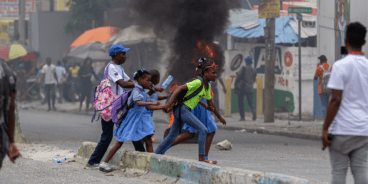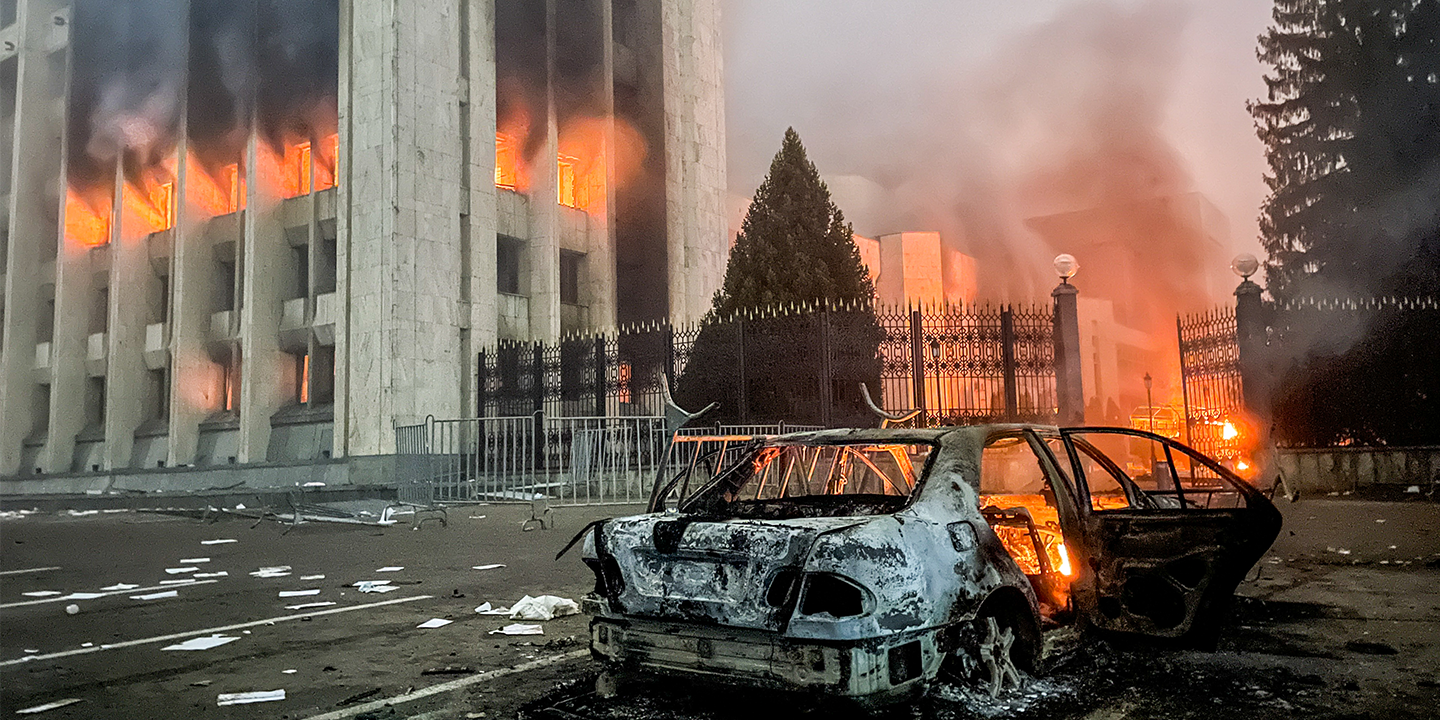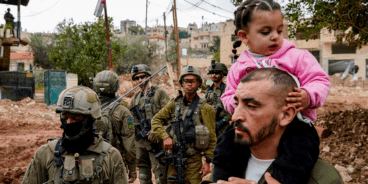

Atrocity Alert No. 283: Myanmar (Burma), Nigeria and Kazakhstan
Atrocity Alert is a weekly publication by the Global Centre for the Responsibility to Protect highlighting situations where populations are at risk of, or are enduring, mass atrocity crimes.
MYANMAR MILITARY LAUNCHES AIR STRIKES IN KAYAH STATE, DISPLACING THOUSANDS
Since 6 January the military in Myanmar (Burma) – the Tatmadaw – has perpetrated a large-scale offensive against Loikaw, the capital of Kayah State, in what may become the heaviest bombardment of a major urban center in Myanmar since the 1 February coup, according to local media. The military has launched several air strikes, including an attack as recently as 11 January, and is continuing to fire heavy weaponry in an attempt to quell anti-junta forces active in the city. At least six civilians have been killed and approximately 60,000 – nearly two thirds of the city’s residents – have been forced to flee since the assault began. A military blockade and ongoing hostilities have prevented additional civilians from fleeing and humanitarian groups from entering the city.
Kayah State – also known as Karenni State – is mainly inhabited by the minority Karenni ethnic group, which is predominantly Christian. For decades, the military has battled intermittently with armed Karenni groups, and hostilities have intensified since the coup. In recent weeks, the Tatmadaw has increasingly perpetrated attacks against civilians and ethnic militias throughout the region. A particularly grave attack occurred on 24 December, when the military shot and burned at least 35 civilians, including four children and two staff of Save the Children, near Mo So village of Hpruso town in Kayah State.
The UN Security Council condemned the killings with a Press Statement on 29 December, and said that, “the members of the Council called for the immediate cessation of all violence and emphasized the importance of respect for human rights and of ensuring safety of civilians.” Although the Council called for accountability, the statement stopped short of naming the Tatmadaw as the perpetrator.
Savita Pawnday, Executive Director of the Global Centre for the Responsibility to Protect, said that, “nearly one year since the 1 February coup, the UN Security Council has only managed to meet privately and issue Press Statements on the situation in Myanmar. The Council needs to hold an open session on Myanmar as soon as possible in order to address the crisis in a public forum so Council members are no longer able to hide behind empty Press Statements and make their plans for action – or lack thereof – public.” The airstrikes on Loikaw and the Christmas Eve massacre point to a dangerous escalation and underscore the urgent need for the Security Council to impose a global arms embargo on Myanmar. UN member states, including ASEAN, should impose targeted sanctions on the oil and gas sectors, the country’s single largest source of foreign currency revenue, to limit the Tatmadaw’s ability to fund and perpetrate atrocities.
HUNDREDS OF CIVILIANS KILLED BY ARMED BANDITS IN NORTH-WEST NIGERIA
At least 200 people were killed and 10,000 displaced as result of a series of attacks by armed bandits in Nigeria’s north-western Zamfara state between 4 and 6 January. Local media have reported that the search for more bodies continues as many people remain missing. The attacks began on Tuesday in the Anka Local Government Area, where more than 300 armed men on motorcycles raided at least eight villages, then subsequently raided 10 more villages in Anka and Bukkuyum Local Government Area on Wednesday and Thursday. Survivors said the armed men reportedly stole approximately 2,000 cattle, burnt homes and mutilated the bodies of the victims. In a statement on 10 January, UN Secretary-General António Guterres strongly condemned the “appalling attacks” in Zamfara and urged the Nigerian authorities “to spare no effort in bringing those responsible for these heinous crimes to justice.”
Conflict between herding and farming communities over land and resources has grown over the past decade in north-west Nigeria. Inter-communal violence has become increasingly deadly as a result of the proliferation of armed banditry groups and gangs who engage in organized cattle-rustling, kidnapping, plunder, murder and rape. While bandit groups are driven largely by criminal motives, ethnic tensions have intensified as many bandits are ethnic Fulani and prey on settled farming communities. Inter-communal conflict has also been further exacerbated by deteriorating political, economic and security conditions, including threats posed by the armed extremist groups Boko Haram and the so-called Islamic State in West Africa.
In an attempt to curb armed banditry in north-west Nigeria, in September 2021 the Nigerian government launched renewed campaigns in the region, deploying a large number of troops, cutting off communication networks and imposing restrictions on movement in affected areas. This militarized approach, however, has inadvertently strengthened bandit groups and resulted in an increase of reprisal attacks against civilian populations. Last week’s attacks in Zamfara were believed to be in response to air raids conducted by the military against bandit hideouts in the Gusami forest and west Tsamre village on 3 January that killed more than 100 bandits, including two of their leaders.
Juliette Paauwe, Senior Research Analyst at the Global Centre for the Responsibility to Protect, said that, “while military operations against armed bandits can be successful in the short-term, the Nigerian government needs to pursue sustainable solutions that address the underlying drivers of inter-communal conflicts like endemic poverty, corruption, youth unemployment and environmental degradation to comprehensively address the threat posed by armed bandits.”
AT LEAST 164 DEAD IN UNPRECEDENTED VIOLENT CRACKDOWN ON PROTESTS IN KAZAKHSTAN
Since protests erupted on 2 January, Kazakhstan experienced its most intense and violent crisis in its thirty-year history after independence. Peaceful protests began in Zhanaozen, an oil town in western Kazakhstan, over a steep increase in gas prices. By 4 January protests spread across the country, expanding the scope of demands to include long-standing socio-economic and political grievances. Nationwide dissent peaked a day later on 5 January, escalating into large-scale looting and clashes in the country’s largest city, Almaty, and resulting in brutal retaliatory violence from the state. According to Kazakh officials, more than 2,000 people have been injured, nearly 10,000 detained and at least 164 killed during the wave of violence and unrest.
As nationwide protests intensified, President Kassym-Jomart Tokayev declared a state of emergency in several areas of the country, including Almaty and the capital, Nur-Sultan. The state of emergency has since been extended to the whole country until 19 January. In Almaty, riot police allegedly used tear gas and stun grenades in clashes with protesters. At the same time, demonstrators seized some government buildings, setting them on fire, and attempted to storm police stations.
UN High Commissioner for Human Rights, Michelle Bachelet, stressed that, “international law is clear: people have the right to peaceful protest and freedom of expression. At the same time, protesters, no matter how angry or aggrieved they may be, should not resort to violence against others.”
President Tokayev called the protests and riots “an act of aggression” and reportedly gave security forces a shoot-to-kill order against protesters, who he called “bandits and terrorists.” This order came as President Tokayev requested assistance from the Collective Security Treaty Organization – a Russian-led security alliance of six countries in the region – to suppress the protests. Approximately 2,300 troops from the alliance were deployed. Security forces have since forcibly regained control in Kazakhstan, employing live fire to end the unrest in Almaty, the epicenter of the violence. Of the 164 people killed, 103 of the deaths were in Almaty, according to the health ministry.
While Kazakhstan has been regarded as a pillar of political and economic stability in the region, authorities have long restricted fundamental rights and ignored demands for genuine socio-economic and political reforms, such as lifting restrictions on peaceful protest and free speech and bans on opposition groups. Rampant economic inequality and discontent has also been growing for decades.
Although a relative calm has been restored in Almaty following nearly a week of unrest, risks for further violence remain as security forces continue to heavily guard the city. It is imperative that security forces and protesters refrain from violence and seek a peaceful resolution to grievances. The police and all security forces must respect their international obligations and protect human rights during the state of emergency. Kazakh officials must promptly, independently and thoroughly investigate all allegations of human rights violations.
Related Content


Populations at Risk, March 2025
